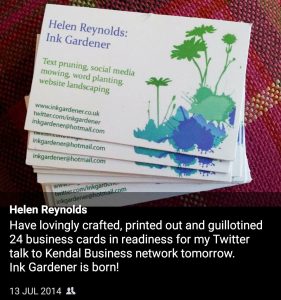Want to become a freelance copywriter in the UK? If you love to write, it could be your best move ever.
Here are some tips from my experience since going freelance in 2014. Plus advice by fellow UK copywriters.
Money
How do you make money as a freelance copywriter?
As an employee, I was always a little in awe of the freelance contractors shipped in to help with projects. How do you make money if you don’t have a regular salary?
Freelance copywriters work in a similar way to an estate agent or a solicitor. We’re paid to work on a project. Often we work on several projects at once. Sometimes a client asks us to continue on a retainer. This means they pay us a certain amount each month for a set number of tasks or hours.
How much does a UK freelance copywriter charge?
Your freelancer rate is not your old salary divided by 365 days. And your new income will, sadly, not be your day rate multiplied by 365 days.
As a freelancer, the following all come out of your earnings:
- Tax – usually 20% if you earn above the Personal Allowance rate, plus National Insurance contributions
- Sick pay
- Holiday pay
- Pension contributions
- Office overheads – electricity, heating, office furniture
- Equipment such as a laptop, printer, printer ink (HP Instant Ink saves me at least £70 a year), stationery, designing and printing business cards, web design, web hosting, URL registration
- Insurance – Public Liability and Professional Indemnity. I started with PolicyBee and am now with Simply Business – use this link for a £25 gift card
- Travel, membership of professional bodies, networking event tickets
So what should you charge? It depends on your location, your sector and your specialities. But it ranges from £250 to £2000 a day. In 2023, the average day rate was £433. This sounds amazing, but remember you won’t be able to charge for every day of the year. Unless you’re contractor, which is a whole other story!
One good rule of thumb is to divide your dream annual freelancing salary by 100 to come up with your day rate. The Professional Copywriters Network rates has more details.
Charge by the project, not the hour or day
As an employee, you probably had set hours. So you’ll think of pricing jobs in the same way. However, freelancing hours are different. Are you charging by the hour or the day? Keep a timesheet, including times spent in meetings, on phone calls and emails.
After your first few projects, you’ll get a feel for how long things take. At this point switch to pricing by project. Otherwise, you’ll get better, and therefore faster, but be charging less.
Another tip – your working week is usually 60 – 70% on projects, 30 – 40% on admin, invoices, networking, marketing yourself, updating your website… Don’t stretch yourself too thin.

Finding work
As a freelance copywriter in the UK, how do you find work?
Contacts, contacts, contacts: My first few clients were friends and family, their friends and family and contacts. I still get referrals from my time as the web manager for the Lake District National Park.
Networking and training events: In my first year of returning to North Yorkshire went to as many networking events as possible. Don’t like networking? Training days feel less ‘salesy’ and you get to learn something too. It’s one of my 10 networking event tips for the shy.
On the strength of past projects: Having a portfolio of past projects is essential. People like to see your track record. When you start, you might do projects for free or at a reduced rate. But nobody else needs to know this.
Have zero experience? To get that first client, ask friends and family if they know a business who needs help. Or volunteer for a project or for a set amount of time with a local charity. Not-for-profit festivals often welcome volunteers to boost their online presence and publicity.
Or why not take a favourite brand or sector, and treat it as a case study on your own website? I did this with my Get higher rankings in Google with shorter sentences blog, using examples from Rolex.
Teaming up with a marketing agency: Successful agencies often need an extra pair of hands. I’m really lucky to work with some talented agencies as a professional associate.
Learn about selling: I met the wonderful Becky of People Buy People in the coffee queue at a tourism conference. This led to my attending her course on selling.
She explained that you’re your business’s director, financial officer, worker and salesperson. However rather than thinking of it as selling, think of it as helping. Are you making a client’s life easier? Then you’re improving their quality of life. It’s just that as you’re not a charity, you need to be paid for your services.
Social media: Target your ideal sector by following organisations or people on social media, such as LinkedIn. Like or, even better, comment on their posts. It’s a gentle tug on the sleeve to announce your presence.
Co-working spaces: I’ve connected with so many brilliant small businesses through chatting to fellow hot deskers.
“I’ve just graduated and want to become a freelance copywriter. Have you any advice?”
Over the years, the York Copywriters’ Coffee meet-ups I founded have welcomed savvy graduates and undergraduates researching careers. The advice full-time freelancers offer is that clients will judge you on your track record and experience. Having five, ten or even 15+ years’ of experience before going freelance is a huge positive.
It’s probably a good idea to get some work experience first. Try roles in the communications team of a large company as well as marketing and advertising agencies. Working on a company intranet is a great way in. Many copywriters start in journalism. You could also ‘side hustle’ with smaller jobs to build up your portfolio.
“I’m a bit shy, and don’t like to approach people. Can I still be a copywriter?”
Yes, but you might not want to go freelance quite yet. Running your own business means going out there and attracting business. For me at least, this has happened through networking, and keeping in touch with people. Plus sometimes you need to pick up the phone to chase a late payment.
Should I take a copywriting course?
If you’ve done any kind of writing for business, chances are you’ve been copywriting without knowing it. And potential clients are more interested in your track record than anything else.
But if you want formal training, I’ve heard good things about the following:
- The Clever Copywriting School – courses
- Marie Forleo’s The Copy Cure course
- Andy Maslen’s Breakthrough Copywriting course
Which sectors and types of copywriting are most in demand?
Anything techie always need humans to explain the benefits, rather than just the features. Fintech (financial technology) and SaaS (software as a service) leap to mind.
As for types of copywriting, it’s not just white papers and blogs. You could write content for:
- podcast scripts
- video scripts
- email sequences
- AI prompting
Networking is still working
In the beginning you need to attend lots of networking events. Some of them will feel a good fit, others might not. But don’t feel pressured into joining up. Occasional events, where you pay for the venue hire and food such as BLaH – Business Ladies Around Harrogate, are an excellent idea. You get to meet different people and there are fewer cliques.
The best networking events usually involve a lot of chatting and can feel like ‘jollies’ for an ex-employee. However they’re an essential part of the work to get the work. I see them as a real perk of freelancing.
The butcher, the baker…
A word to the wise about ‘The Butcher, The Baker, The Candlestick Maker’ networking groups. Within these groups only one person is allowed for each specialist slot. Members are heavily encouraged to prioritise doing business with those within the group. And to bring along new faces. Sometimes they need to meet a quota, so will ask you to be a guest. Even though they know you won’t be able to join.
I didn’t know this. So couldn’t work out why a delegate looked annoyed when I explained what I did. Until he stood up and announced “I’M a copywriter too”. This meant the slot was filled, I wouldn’t be accepted and I’d wasted my time. So research them first before saying yes.

Payment
Copywriting industry standard: Charge 50% up front
A 50% project kick-off fee is the industry standard. They’re taking a chance on your doing the work. But you’re taking a chance on their paying you the full amount. If they dispute this, walk away.
The trigger for the final invoice should be linked to something you do, rather than the client. I used to wait until they’d supplied feedback on the first draft. Now, I send the second 50% invoice at the same time as the first draft.
The only exception is for larger projects. These may need breaking down into 33% before the start, 33% mid-project and 34% end of project.
Often the larger the client, the slower the payment
Unfortunately some large firms have ridiculously long terms of payment where they take weeks to pay. It’s therefore essential to find out their terms of payment and be paid a portion up-front so you can still pay the bills. Do they need to raise a Purchase Order first? If so, you need to add this reference number to your invoice.
If possible, try to build up a buffer savings account to reduce the stress of late-paying clients. If you’ve a few different clients, rather than just one or two big contracts, it helps even out the payment rollercoaster.
Expenses aren’t free money
When I started, my Dad kept saying “oh just put it on expenses!” But expenses don’t come from a giant pot of free money. You still have to pay for them. You just don’t get charged tax on them in a year’s time.
To discount or not to discount?
It’s up to you. I explain that I would give 10% off… If only York City Council would knock the same off my council tax!
If you’re discounting to build up your portfolio or help a charity, show the full amount first on your invoice. Then the discount. Followed by the total payable.
Why? If anyone asks “How much was your copywriter?” you want them to quote your full rate and say “but they gave us a discount”. Otherwise they will quote your discounted rate.
Tax
Turnover and profit
You are taxed on your profit, not your turnover. Don’t know the difference? Turnover is the money that comes in. Profit is turnover minus expenses.
So I could land a project worth £3,000. Whoopee! But then the client asks me to work in-house 300 miles away, so I need to spend £100 on overnight accommodation, £20 on fuel, £30 on food. So the profit on this job, before tax, is actually £2,850.
Of course I might be able to claim some of the £100 back as expenses through my tax assessment. But I’ll have to wait.
Record your income and outgoings
I record my income and expenses each month on a spreadsheet. It doesn’t take long and avoids a mad scramble when I need to submit my tax assessment.
Save for tax from the beginning
You can hive off this off from the start – see my Profit First tip below.
Don’t forget National Insurance
If you’re self employed, how much you pay depends on your profits.
When your profits are more than £6,700, your Class 2 contributions are “treated as having been paid to protect your National Insurance record” according to gov.uk.
Profits more than £12,500-ish? That’s an extra 6% for Class 4 National Insurance contributions.
For the exact figures, check out the UK government’s Self Employed National Insurance Rates.
Warning: Payments on Account in July
Once you’ve paid more than £1,000 on tax, your next bill will usually include an additional payment towards next year’s bill. This is known as Payments on Account which is taken on 31 July as well as by 31 January. Each payment is half your previous year’s tax bill. That’s 50% more tax due – a real shock when you don’t know about it!
You can submit your tax assessment at any time
You may have heard self-employed friends huff and puff in January about ‘getting their taxes done’. But you can submit them any time after 6 April. This is because the financial year runs from April to March.
I try to sort mine out in the spring following the end of my tax year. My accountants are less busy then. Plus I get to know exactly what my July tax bill will be.
Do you need an accountant?
I switched to freelancing from PAYE in the middle of a tax year, so felt I needed an accountant. However I’ve stuck with them as they’re good sounding boards and flag up potential issues. There are also rumours that you’re less likely to be investigated by HMRC if you use a reputable accountant.
To find one, ask your contacts, or chat to accountancy firms at networking to find the ones you ‘click’ with. I met J and D Accountants in Scarborough when we were volunteering as experts for a Pop-Up Business Cafe. Their emails about emergency grants, tax updates and business measures were especially useful during the pandemic.
Consider using Profit First
If you’re used to a regular wage, having to make tax payments can be a shock. I strongly suggest using the Profit First system, where you assign pots of money to different areas.
For example when I get paid, 5% goes into my Profit pot for treats paid for by the business, 60% into Owner’s Compensation – as in wages to myself, 25% to Tax/NI and 10% to Operating Expenses. I sometimes adjust the percentages depending whether a pot like Operating Expenses is overflowing or needs a top up.
Find out more in my article Profit First for UK freelancers: the potted approach.

Looking after yourself and your creativity
Turn off phone notifications
One evening, a client email popped up which started my cogs whirring and kept me awake. My email is now set up to appear 9am – 5pm. I can only access it through opening my phone’s app panel and have taken off notifications for my business social media accounts. My ‘shop’ opens when I open my laptop.
You need downtime. You also need to set boundaries with clients. If you reply at 11pm, guess what? They’ll expect the same service the next time.
You must protect your brain and allow it to refresh before the next working day. Otherwise you’re cheating your clients as you won’t deliver the quality of service they’ve paid for.
Trust your gut
It may seem illogical, but if you get a sinking feeling when you talk to a potential client, walk away. It’s hard to turn down work. But your instinct is telling you it’s not the right project. Weirdly my stomach has known this every time. When I overrule it, I always regret it.
I definitely have learnt to trust my gut. Fluttery feeling means Out Of Comfort Zone But Worth It. A sinking feeling = “Run Away!” or rather a more gracious “I don’t think I’m the right copywriter for you”. My Lessons Learnt archive backs this up!
— Helen Reynolds | Ink Gardener Copywriting (@InkGardener) June 22, 2021
The positive side of difficult clients
There will be businesses who will try to not pay you, or mess you about. Warning signs are they:
- quibble about price or payment terms from the start
- have unrealistic deadlines. However if you’re happy to work weekends or overnight, you can charge a ‘rush fee’ of 25%
- can’t clearly explain what their product or service is
- want to arrange lots of meetings before committing
- want a free sample of your writing
- are a bit dismissive about what you do but someone told them they should get a copywriter involved
If you do get burnt, try not to take it personally. You really can’t please all of the people all of the time.
However as a freelancer, you’ll never have to deal with them again. See them as a way to improve your processes and terms and conditions.
Slow and steady wins the race
There are some people who seem to play at running a business. One fellow copywriter calls them ‘The Surface People’. They’re the ones who went mad on sleek logos and the latest computer and even offices. But are they being bankrolled by a partner, a redundancy pay-out or a trust fund? Will they still be in business in three years’ time?
I started with an old laptop, a bog-standard website I set up myself and initially worked from my dining table. Here are my very first home-made business cards:

Impostor syndrome is rife in entrepreneurs. There’s always someone who seems to be doing it better, or getting all the press coverage or the awards. Don’t worry. We’re all on different paths.
Be kind to yourself
You are your most valuable asset. Without you, the work doesn’t get done. So if you need a physio session in the middle of the day, or to finish early, do. Presenteeism isn’t necessary if the work gets done. Your health is.
Good luck. I hope to see you – on social media or in person – soon!
About the author
Helen Reynolds is a freelance copywriter with 25 years+ experience of writing for digital platforms. Based in York, she sows Google and customer-friendly web content for businesses, organisations and charities. Helen creates Google-friendly web content, ‘plug and play’ tailored social media posts and offers practical training.

